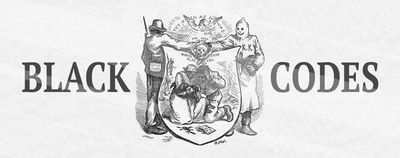
Good Morning POU!
When slavery ended in the United States, freedom still eluded African Americans who were contending with the repressive set of laws known as the black codes. Widely enacted throughout the South following the Civil War—a period called Reconstruction—these laws both limited the rights of Black people and exploited them as a labor source.

In fact, life after bondage didn’t differ much from life during bondage for the African Americans subjected to the black codes. This was by design, as slavery had been a multi-billion dollar enterprise, and the former Confederate states sought a way to continue this system of subjugation.
“They may have lost the war, but they’re not going to lose power civically and socially,” says M. Keith Claybrook Jr., an assistant professor in the Department of Africana Studies at California State University, Long Beach. “So, the black codes were an attempt to restrict and limit freedom.”
Losing the Civil War meant the South had little choice but to recognize the Reconstruction-era policies that abolished slavery. By using the law to deny African Americans the opportunities and privileges that white people enjoyed, however, the one-time Confederacy could keep these newly liberated Americans in virtual bondage.
White planters in these states denied Black people the chance to rent or buy land and paid them a pittance. The 1865 ratification of the 13th Amendment prohibited slavery and servitude in all circumstances “except as a punishment for crime.” This loophole resulted in Southern states passing the black codes to criminalize activities that would make it easy to imprison African Americans, and effectively force them into servitude once more.

First enacted in 1865 in states such as South Carolina and Mississippi, the black codes varied slightly from place to place but were generally very similar. They prohibited “loitering, vagrancy,” Claybrook says. “The idea was that if you’re going to be free, you should be working. If you had three or four Black people standing around talking, they were actually vagrant and could be convicted of a crime and sent to jail.”
In addition to criminalizing joblessness for African Americans, the codes required Black people to sign annual labor contracts that ensured they received the lowest pay possible for their work. The codes contained anti-enticement measures to prevent prospective employers from paying Black workers higher wages than their current employers paid them. Failing to sign a labor contract could result in the offender being arrested, sentenced to unpaid labor or fined.
Fees were the easiest way to reinstitute servitude, as African Americans earned so little that paying a steep fine was out of the question for most of them. Failure to pay fines allowed the state to order them to work off their balances, a system called debt peonage. Typically this work was agricultural in nature, just as Black Americans had performed while enslaved.
The black codes not only forced African Americans to work for free but also essentially placed them under surveillance. Their comings and goings, meetings and church services were all monitored by the authorities and local officials. Black people needed passes and white sponsors to move from place to place or to leave town. Collectively, these regulations codified a permanent underclass status for African Americans.

